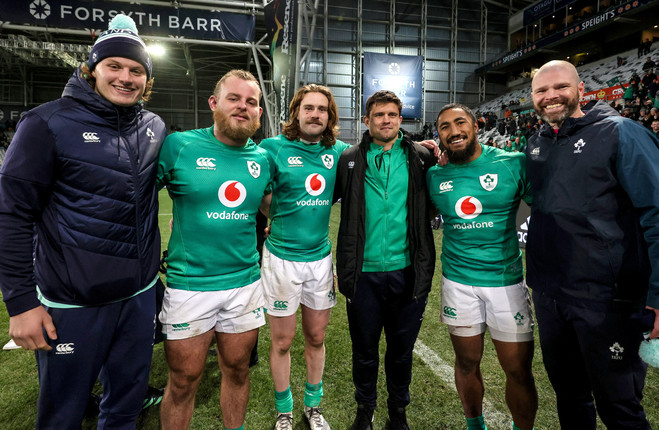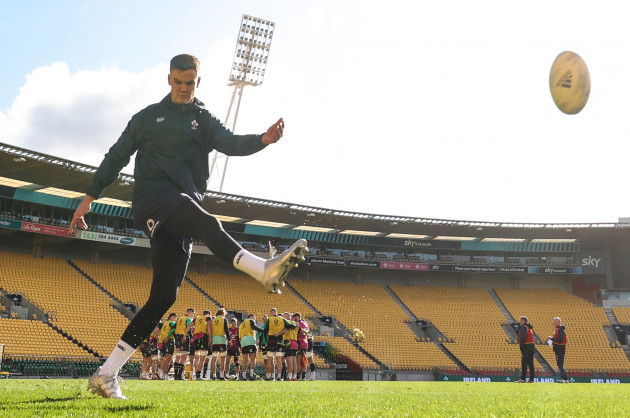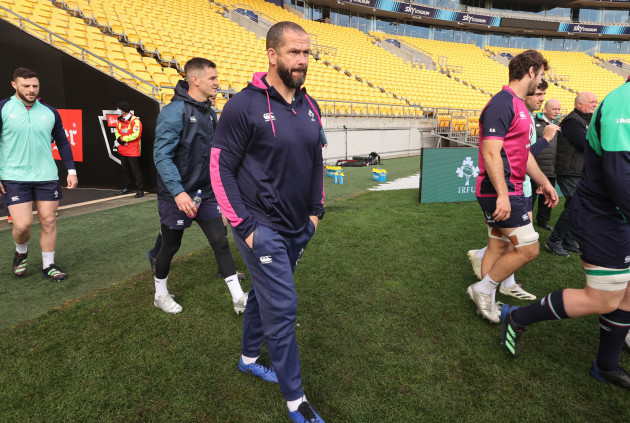LAST UPDATE | 15 Jul 2022
HERE IN WELLINGTON, the Irish have arrived. The local paper reported in big, bold ink how Andy Farrell’s team is now the No2 ranked side in the world while the local Irish bar, JJ Murphy’s, has been invaded by the gentlest army history has known.
The word history has been bandied about quite a bit this week, Ireland intent on making it, the All Blacks on avoiding it. So far this century, New Zealand have yet to lose two home games on the trot, 1998 the last time that particular humiliation occurred.
Way back then, Ireland would have been happy to win two in a row, their only victories that year coming against Georgia and Romania; the remaining seven Tests lost.
It’s been some turnaround in Irish rugby since, a story often told. But it is a more recent story that needs a little explaining because it is only 19 months since Ireland stumbled their way to a 23-10 win over Georgia, three miserable points the sum total they managed in the second-half of that game.
Pressure was mounting when the opening two games of the following Six Nations were lost, and it’s easy to forget now that there were some columnists calling for Andy Farrell’s head, coming back for a second bite at him after a poor second-half showing against the Scots a few weeks later. “We weren’t so good that day,” recalled Johnny Sexton yesterday.
But since then they have been, winning 11 of their 13 matches, scoring more tries than any other team in world rugby this year, conceding fewer than everyone else in this season’s Six Nations.
You could say Paul O’Connell’s addition to the coaching ticket has been central to that change, the Munster man’s expertise having the dual benefit of freeing up Simon Easterby to concentrate solely on the defensive aspect of his job spec. As those parts of Ireland’s game began to function more efficiently, so too did a shift in selection policy, the starting XV loaded with Leinster players whose familiarity with one another’s game transferred onto an international stage.
There’s more. Earlier this week Farrell spoke about the growing belief in his squad and their faith in the side’s system and structures, a point Caelan Doris picked up on yesterday. “Our coaches are world class,” the No8 said. “We believe in what they are saying. Like, when we come in at half-time in games, they see what needs fixing. They tell us, getting the message across in concise points.”
There’s evidence to back up Doris’ point. Across the last 15 months and 13 games, Ireland have not once been outscored by the opposition after the half-time break. Better again, they managed to come from behind to beat New Zealand in Dublin last November; at Twickenham they blew England away in the final quarter and even the two games they lost, to France in February, and the All Blacks two weeks ago, they made a go of it in the second half.
“We’re learning all the time,” said Sexton. “Like, that time we went to Paris, we never spoke about the enormity of the occasion beforehand and for some players, it was their first game in a crowded stadium for a couple of years. We sort of didn’t acknowledge that.”
And they paid the price. It was 19-7 to France at half-time but 30-24 at full-time, Ireland outscoring the French 17-11 after the break.
“You turn up and the stadium is obviously full of French people, flags, everyone was going ‘Oh my god, we haven’t played in this before.’
“It took the lads by surprise early in the game, we started poorly, but we reacted, we responded. Away from home, it’s about embracing the atmosphere and thriving in it.”
For Sexton the way Ireland finish games is no surprise because the last year and a half has seen them invest a lot of time in improving their psychological resilience. “Look, we obviously need to get better at the back end of the first-half, too,” said Sexton, “but if you look at how we started the second-half last Saturday, that was great. We just need to keep doing that.”
It’s been happening. New Zealand last Saturday, they won the second half 13-5; the week before – they were 28-5 down at the break but outplayed the All Blacks after it, had two tries disallowed, two more awarded.
England in March saw them pile on the scores late on, the strength of their bench crucial that day. They outscored England 17-6 after the break en route to a 32-17 win. Most impressive was what they did last November.10-5 down at half time to the All Blacks, they won 29-20, or another way of looking at it, they won the second half 24-10.
Doris doesn’t see it as a statistical quirk, believing instead the stats are a reflection of the coaching staff’s ability to think on their feet.
“We have had a clean slate going out in the second half of games, having more awareness around what the opposition are doing, and having an ability to make quick fixes,” he said before explaining how much of the mental coaching coming from Keegan focuses on ‘staying in the moment’. In other words, forgetting mistakes and moving on.
“What works for us at half-time, between the players and the coaches, is that you do not get a cluster of different messages,” says Doris. “Andy (Farrell) is an unbelievable speaker, an unbelievable motivator but he is well able to whittle it down to a few points and get us on track.”
That precise point was one Warren Gatland also made in his Daily Telegraph column this week, the former Lions coach saying Farrell is one of the best communicators in the business, concise in his message, passionate in his delivery.
We heard it for ourselves when he spoke to us yesterday in the Jerry Collins stadium just outside Wellington, as he pointed out Collins’ childhood home just 100 yards from the clubhouse where he learned his trade. Later, when asked about the need to remain disciplined, he quietly pointed out how the laws of the game are a bit like the weather, in that you may not like them but you have to get on with it.
“Some teams play on the edge; we like to keep a low penalty count,” he said.
It seemed a minor point. But again an examination of the record books backed up his assertion. Across the last 15 games, Ireland have conceded more than 10 penalties in any particular game on just three occasions. They’ve had one sin-binning in their last seven games; their opponents have had six. Ireland haven’t had a sending-off since Bundee Aki’s dismissal against England 15 months ago; the opposition have had three in the last five matches.
Fitter, more disciplined, mentally stronger – Farrell may be using several of the same faces that he selected 18 months ago. But they’re a different team.



